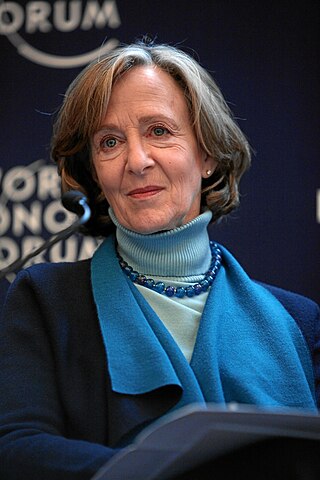
The Pratt School of Engineering is located at Duke University in the United States. The school's associated research, education, alumni and service-to-society efforts are collectively known as Duke Engineering.

Susan Hockfield is an American neuroscientist who served as the sixteenth president of the Massachusetts Institute of Technology from December 2004 through June 2012. Hockfield succeeded Charles M. Vest and was succeeded by L. Rafael Reif, who had served in her administration as Provost. Hockfield was the first biologist and the first woman to serve as the Institute's president. Hockfield currently serves as a Professor of Neuroscience in MIT's Department of Brain and Cognitive Sciences, a Joint Professor of Work and Organization Studies in MIT’s Sloan School of Management, and a member of the Koch Institute for Integrative Cancer Research. She is also a director of Break Through Cancer, Cajal Neuroscience, Fidelity Non-Profit Management Foundation, Lasker Foundation, Mass General Brigham, Pfizer, Repertoire Immune Medicines, and the Whitehead Institute for Biomedical Research; a lifetime member of the MIT Corporation; and a board member of the Belfer Center at the Harvard Kennedy School of Government. Before returning to MIT following her presidency, Hockfield held the Marie Curie Visiting Professorship at Harvard University's John F. Kennedy School of Government.
The University of Texas Health Science Center at Houston (UTHealth) is a public academic health science center in Houston, Texas, United States. It was created in 1972 by The University of Texas System Board of Regents. It is located in the Texas Medical Center, the largest medical center in the world. It is composed of six schools: McGovern Medical School, The University of Texas MD Anderson Cancer Center UTHealth Graduate School of Biomedical Sciences, UTHealth School of Dentistry, Cizik School of Nursing, UTHealth School of Biomedical Informatics and UTHealth School of Public Health.
The Duke University School of Medicine, commonly known as Duke Med, is the medical school of Duke University. It is located in the Collegiate Gothic-style West Campus of Duke University in Durham, North Carolina. The School of Medicine, along with the Duke University School of Nursing, Duke University Hospital, Duke Regional Hospital, Duke Children's Hospital, Duke Raleigh Hospital, and other affiliated hospitals, clinics, and laboratories, make up the Duke University Health System. Established in 1925 by James B. Duke, the School of Medicine has earned its reputation as an integral part of one of the world's foremost patient care and biomedical research institutions.

The Tri-Institutional MD–PhD Program is an MD–PhD program based in New York City that was formed by combining earlier MD–PhD programs that had their inceptions in 1972. The current version of the program, which is operated by Weill Cornell Medicine, Rockefeller University, and Memorial Sloan Kettering Cancer Center's Sloan Kettering Institute, was created in 1991.

The Touro College of Osteopathic Medicine (TouroCOM) is a private medical school with a main campus in the neighborhood of Central Harlem in New York City and an additional campus in Middletown, New York. It is a division of Touro College and University System.

The Medical College of Virginia/Virginia Commonwealth University School of Medicine is the medical school of Virginia Commonwealth University, a public research university in Richmond, Virginia. It is the largest and oldest continuously operating medical school in Virginia. The school traces its beginnings to the 1838 opening of the medical department of Hampden–Sydney College, which in 1854 became an independent institution known as the Medical College of Virginia (MCV). In 1968, MCV joined with the Richmond Professional Institute to form Virginia Commonwealth University. The School of Medicine is one of five schools within the VCU Medical Center and Children's Hospital of Richmond at VCU.

The University of California, Riverside (UCR), School of Medicine is the graduate medical school of the University of California, Riverside, acting as one of six University of California medical schools. It enrolled its first class in 2013, with the first class of 40 medical students receiving their degrees on June 9, 2017.

Dr. Hannah Valantine is the Chief Officer for Scientific Workforce Diversity at the United States National Institutes of Health.

The Mayo Clinic Graduate School of Biomedical Sciences (MCGSBS), formerly known as Mayo Graduate School (MGS), is one of the schools of higher education within the Mayo Clinic College of Medicine and Science. It offers graduate training in the biomedical sciences with programs for Ph.D., M.D.-Ph.D., and master's degree-seeking students. In addition, Mayo Clinic Graduate School of Biomedical Sciences offers summer undergraduate research fellowships and post-baccalaureate research opportunities.
Joan Y. Reede is an American physician. She is Harvard Medical School's inaugural dean for diversity and community partnership in the Office of Diversity, Inclusion, and Community Partnership. She is also a member of the National Academy of Medicine. She is known for creating programs that mentor and support minority physicians and female physicians. Alumni of her programs have created a 501(c)(3) organization called The Reede Scholars in her honor.

Valerie Sheares Ashby is an American chemist and university professor who currently serves as president of the University of Maryland, Baltimore County. She was the Dean of Trinity College of Arts and Sciences at Duke University from 2015 to 2022 and formerly chair of the chemistry department at the University of North Carolina at Chapel Hill from 2012 to 2015. With her research group, she holds ten patents. On April 4, 2022, it was announced that Ashby would assume the position of president of the University of Maryland, Baltimore County.

Daniel Asua Wubah is a Ghanaian-American president of Millersville University of Pennsylvania. Prior to that he was the Provost at Washington and Lee University. In his private life, Wubah is a tribal king, Nana Ofosu Peko III, Safohene of Breman Traditional Area in Ghana. He is the first Ghanaian-born president of an American university.
JoAnn Trejo is an American pharmacologist, cell biologist, a professor, and also an assistant vice chancellor in the department of health sciences faculty affairs in the Department of Pharmacology at the School of Medicine at University of California, San Diego. She is also the assistant vice chancellor for Health Sciences Faculty Affairs. Trejo studies cell signalling by protease-activated G protein-coupled receptors (GPCRs). She is also actively involved in mentoring, education and outreach activities to increase the diversity of science.
Elizabeth G. Loboa is an American biomedical engineer, inventor, researcher and academic administrator currently serving at Southern Methodist University (SMU) as provost and vice president for academic affairs.

The Kaiser Permanente Bernard J. Tyson School of Medicine is a medical school associated with the Kaiser Permanente health system and located in Pasadena, California. The school matriculated its inaugural class of 50 students in July 2020. In November 2019, the school was renamed in honor of late Kaiser Permanente Chairman and CEO Bernard J. Tyson.

Farah D. Lubin is an American neuroscientist and Professor of Neurobiology and Cell, Developmental, and Integrative Biology at the University of Alabama at Birmingham within the Heersink School of Medicine. Lubin is the Principal Investigator of the Lubin Lab which explores the epigenetic mechanisms underlying cognition and how these mechanisms are altered in disease states such as epilepsy and neurodegeneration. Lubin discovered the role of NF-κB in fear memory reconsolidation and also uncovered a novel role for epigenetic regulation of BDNF during long-term memory formation and in epilepsy leading to memory loss. Lubin is a champion for diversity at UAB as the Director of the Roadmap Scholar Program and as a faculty mentor for several institutional and national programs to increase retention of underrepresented minorities in STEM.

Gilda A. Barabino is the president of the Olin College of Engineering, where she is also a professor of biomedical and chemical engineering. Previously, she served as the dean of The Grove School of Engineering at the City College of New York, and as a professor in the Departments of Biomedical Engineering and Chemical Engineering and the CUNY School of Medicine. On March 4, 2021, she became the President-Elect of the American Association for the Advancement of Science.

Renetta Garrison Tull is an American electrical engineer, global policy strategist, and works to advance diversity and inclusion in science, technology, engineering, and mathematics (STEM). Tull is the inaugural Vice Chancellor of Diversity, Equity, and Inclusion at University of California, Davis and a founding Director of the National Science Foundation funded program PROMISE: Alliances for Graduate Education and Professoriate, which aims to increase the number of underrepresented students in STEM. Tull previously served as Vice Provost for Strategic Initiatives at the University of Maryland, Baltimore County (UMBC) and was also the Director of Graduate and Professional Pipeline Development for the University System of Maryland (USM) where she also served as the co-Principal Investigator and co-director of the Louis Stokes Alliance for Minority Participation. On a global scale, Tull was selected as the keynote speaker for the United Nations Educational, Scientific and Cultural Organization (UNESCO) event on the Commission on the Status of Women in Engineering Fields, and was the only American and only female finalist for the Global Engineering Deans Council Airbus Diversity Award in 2015.
Manu Omar Platt is an American biomedical engineer who is a professor at the Georgia Institute of Technology Wallace H. Coulter Department of Biomedical Engineering. He serves as Diversity Director of the Center on Emergent Behaviors of Integrated Cellular Systems.














